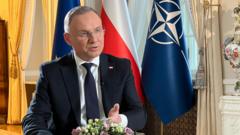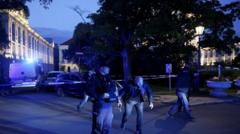In a recent statement, Polish President Andrzej Duda emphasized the importance of US nuclear weapons in Poland as a defensive strategy against Russian aggression, highlighting deteriorating security in the region following Russia's military actions and nuclear deployments in Belarus.
Poland's Duda Advocates for US Nuclear Weapons as Deterrent Against Russia

Poland's Duda Advocates for US Nuclear Weapons as Deterrent Against Russia
President Andrzej Duda calls for the deployment of US nuclear weapons in Poland, framing it as a necessary measure for national and regional security amid increasing tensions with Russia.
Poland's President Andrzej Duda has reiterated his appeal for the United States to place nuclear weapons on Polish territory, asserting that such a move would enhance the country's security amid perceived threats from Russia. Speaking in Warsaw, Duda characterized today's Russia as a formidable adversary, likening it to the aggressive posture of the former Soviet Union. He criticized what he referred to as “Moscow’s imperial greed,” expressing his belief that US nuclear weapons would provide a crucial deterrent.
Duda's proposal is in direct response to the decision by President Putin to introduce Russian tactical nuclear weapons in Belarus, a country that borders Poland and Ukraine. He articulated that the Russians, who are currently involved in military operations in Ukraine, pose a significant danger, stating, "It's the same Russia that's attacking Ukraine today." The Polish President emphasized that positioning US nuclear weapons in Poland would serve as a vital countermeasure and enhance NATO’s presence in the region.
Despite potential provocations to Russia, Duda regards the initiative as essential for defense. He believes that integrating US nuclear capabilities would not only bolster Poland's defense posture but also deepen the US commitment to the nation's security. Duda pointed out that Poland is already one of the highest defense spenders within NATO, allocating nearly 5% of its income towards military expenditure.
The context of this discussion follows remarks made by Polish Prime Minister Donald Tusk, who, although ideologically different from Duda, also called for an increase in defense spending and indicated the necessity of exploring nuclear deterrents given geopolitical shifts affecting Poland and Ukraine.
While Duda refrains from criticizing former US President Donald Trump, who is known for his ambiguous stance on NATO commitments, he has been vocal about the need for concrete actions against Russia. He has advocated for using frozen Russian assets in Europe, advocating for their use to assist Ukraine in its defense as well as reconstruction efforts post-conflict.
Duda’s strong rhetoric underscores the growing concerns in Central and Eastern Europe regarding security and resilience against Russian aggression, setting the stage for continued dialogues on military alliances and regional defense strategies.





















